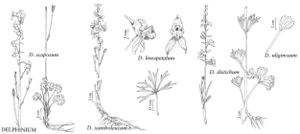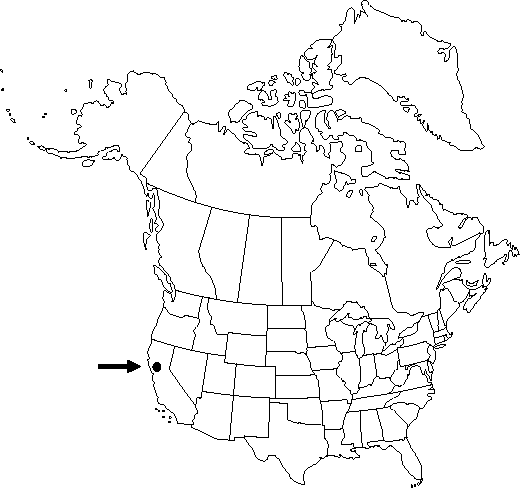Difference between revisions of "Delphinium uliginosum"
Proc. Calif. Acad. Sci. 1: 151. 1885.
FNA>Volume Importer |
imported>Volume Importer |
||
| (2 intermediate revisions by 2 users not shown) | |||
| Line 55: | Line 55: | ||
|publication year=1885 | |publication year=1885 | ||
|special status=Endemic;Illustrated | |special status=Endemic;Illustrated | ||
| − | |source xml=https:// | + | |source xml=https://bitbucket.org/aafc-mbb/fna-data-curation/src/2e0870ddd59836b60bcf96646a41e87ea5a5943a/coarse_grained_fna_xml/V3/V3_443.xml |
|genus=Delphinium | |genus=Delphinium | ||
|section=Delphinium sect. Diedropetala | |section=Delphinium sect. Diedropetala | ||
Latest revision as of 21:48, 5 November 2020
Stems 10-30(-70) cm; base reddish or not, nearly glabrous. Leaves mostly on proximal 1/4 of stem; basal leaves 6-8 at anthesis; cauline leaves 0-5 at anthesis; petiole 0.3-7 cm. Leaf blade obdeltoid, apically several parted, 1-8 × 1-7 cm, ± fleshy, glabrous; ultimate lobes 0-3, width 3-20 mm (cauline only); margins of basal leaf, measured less than 1 cm from blade base, demarcating less than 90° of arc when leaf laid flat. Inflorescences 5-20(-48)-flowered, ± open; pedicel 0.3-3(-10) cm, glabrous to puberulent; bracteoles 2-3(-5) mm from flowers, green to blue, lanceolate-linear, 3-4(-7) mm, puberulent. Flowers: sepals dark blue, nearly glabrous, lateral sepals spreading, 9-15 × 5-8 mm, spurs usually upcurved, ascending 30-45° above horizontal, 10-14 mm; lower petal blades slightly elevated, ± exposing stamens, 4-5 mm, clefts 2-3 mm; hairs centered, densest on inner lobe above base of cleft, also on margins, white. Fruits 10-18 mm, 4.1-4.5 times longer than wide, puberulent. Seeds: seed coat cells with surfaces bumpy or wavy. 2n = 16.
Phenology: Flowering late spring–early summer.
Habitat: Serpentine streamsides, chaparral, grassland
Elevation: 400-600 m
Discussion
Although some populations are large, Delphinium uliginosum is very local. Hybrids with D. hesperium subsp. pallescens have been seen.
Delphinium uliginosum is a very distinctive species, not likely to be confused with any other. The fan-shaped, slightly dissected leaves are apparently unique in the genus.
Selected References
None.

